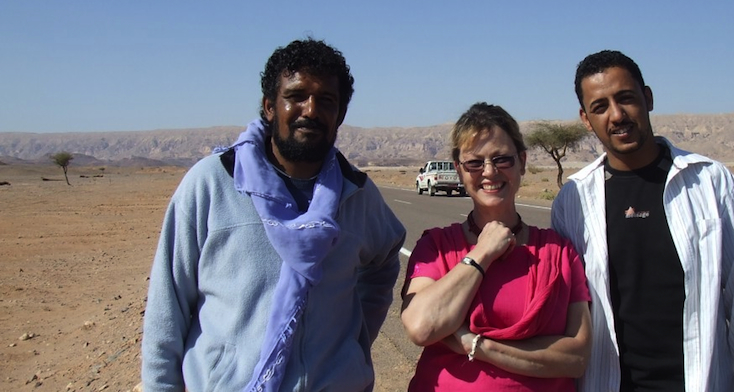Bedouin Power in the New Egypt
By Hilary Gilbert and Mohammed Khedr al Jebaali
Since its founding in 2006, the Community Foundation for South Sinai (the mo’assessa) had been providing small grants for health and economic projects for Bedouin people, a desert-dwelling Arabian ethnic group who face significantly greater poverty than other Egyptians. In January 2011 the mo’assessa suddenly found itself in the middle of the Egyptian revolution—and they quickly retooled to help Bedouin people, who had long been excluded from meaningful civic participation, understand and exercise their civil rights.
What did the foundation manage to accomplish during this tumultuous time, how, and what does the future hold? Following is an excerpt from a report by Co-founder and Executive Chair Hilary Gilbert and Coordinator Mohammed Khedr al Jebaali.
A New Role for the mo’assessa
During the brief window post-Revolution when the state apparatus was too shaken to contradict its challengers, many Bedu, who had learned to believe that nothing they do as individuals can make much difference, were effervescent at the prospect of change. We saw an extraordinary opportunity to give people a belief in their own agency.
Members of the mo'asseessa: Bedouin trustee Faraj Mahmoud, Co-Founder and Executive Chair Hilary Gilbert, and Coordinator Mohammed Khedr al Jebaali.
However, there were significant obstacles. Many communities have no access to media and therefore no information on which to base decisions. Poor or absent education often hampers informed discussion, and cultural conservatism makes expression even harder for women, whose voices are almost never heard outside the home. Social media, much lauded as an organizing tool in urban areas during the revolution, played no role in galvanizing Sinai’s youth.
In larger towns on the coasts, however, the young people, including some women, were avidly discussing new political developments. Community leaders wanted us to help people embrace the coming changes and saw democratization as a survival strategy. They recognized the huge potential for political instability to damage South Sinai’s lifeblood: its tourism industry.
With elections just a few months away, we wanted to help encourage this newfound potential for civic engagement, confirm a sense that Bedu can think for themselves about how to create a better future, and give people a chance to learn experientially that the choices they make can make a difference.
Making Bedouin Voices Heard
Adapting materials from a Cairo-based NGO and with funding from the Global Fund for Community Foundations amongst others, we developed a program called Making Bedouin Voices Heard. In the heady days of Spring 2011, our program was specially designed to deliver two sets of meetings. The first was to inform people about the Revolution, what it meant for them as citizens, and what qualities they might look for in new leadership; the second, to help people consider their rights and responsibilities as citizens, and how they might exercise both in addressing community priorities. Both sets of meetings were designed to reach out to women and young people.
In all we conducted meetings in 62 towns, villages and remote desert hamlets and helped people register to vote. Having been offered an arena where they could speak out safely, at least 2,749 people (approaching 7 percent of the population) came together to discuss their ideas, rights and priorities. Fifty-eight percent of our attendees were under 25, 53.5 percent of whom were women. Given that 18-24 year-olds account for just 36 percent of the population in Egypt[1], we knew we had effectively attracted young people of an age to take part in shaping their country’s future.[2]
Bedouin Exercising Their Rights
The scale of success of the first round of meetings surprised us. At the start of meetings just 29% said they intended to vote. By the end of meetings, that figure rose to 77%. In addition, 12 young Bedu–three of whom were young women– decided to put themselves forward as candidates.
While none made it past the first round of voting, Bedouin turnout at the polls -although not officially recorded – was far larger than usual. It resulted in a landslide: eight out of the 12 South Sinai representatives elected were Bedu, including the first independent Bedouin woman parliament member.
The second round of meetings focused on giving people information and grassroots support to tackle issues themselves, and we ran 20 special meetings facilitated by signers for the large number of Bedouin who are congenitally deaf. With this support, deaf participants told us that for the first time they felt “like they are a part of things, like they are human beings like everyone else.” We have also recruited men and women “link volunteers” (mandub mutatawa’) to provide a two-way flow of information, enabling the mo’assessa to be quickly informed of community issues and channeling advice, information and support back to local people.
Some Bedouin youth, like this twelve-year old boy, support their families by being camel guides. (Courtesy of Community Foundation of South Sinai)
More information has translated to economic benefit, and in some areas the number of Bedouin who have government jobs has increased nine-fold. People have learned how to apply, how to approach government officials, how to insist on their rights, and how to complain if they do not obtain them. While these are low-paid, unskilled jobs, they do provide pensions and opportunities for advancement, which is an important advance for a population that typically lives on less than $1 a day.
Success Factors: Trust, Global Vision, and Local Roots
Above all, our objective was to generate trust. Everything we have done has been through Bedu working with Bedu within Bedouin cultural norms. For example, we conducted separate meetings for women and men, both out of respect for cultural practices and to give women a safe space to express themselves. This approach has given us a unique ability to reach remote, conservative communities with which no one else has previously engaged. We have been told that the fact that someone took the trouble to go out to meet people where they were, to take their concerns seriously, has been abundantly appreciated.
Giving people the conceptual tools to become active participants rather than passive subjects has had a galvanizing effect far beyond our expectations, but if we have succeeded, we can attribute it to a combination of global vision and local roots not available to most Egyptian NGOs. First, we are supported by a growing network of international community foundations. Community foundations, while rooted in philanthropy, play a well-documented role as community conveners and leaders. That role has helped us form the relationships necessary to support grassroots change.
Our structure and our economic development projects also gave us some protection from government crackdowns on NGOs promoting democracy. We succeeded in part because our other work is demonstrably charitable in intent and effect, and our meetings legitimately served the purpose of community needs assessments.
Finally, as an international organization (Bedouin, Egyptian, and British) we could avoid some of the hurdles of Egyptian bureaucracy. It has also helped us bypass the prevailing national discourse of Bedu as “traditional” people who have no aspirations as modern citizens. Recognizing that belief as a stereotype, we could help elevate Bedouin concerns that are usually overlooked by centralized state planners.
The Challenges Ahead
We have been cautious in interpreting these outcomes as a direct result of our work. Yet because absolutely no one else is engaging with our communities, the evidence suggests it has been responsible at least for igniting a fire that has kept on burning by itself, fueled by a long-standing sense of exclusion and injustice.
Nonetheless, the challenges ahead are significant. Despite tangible changes, people still feel uncertainty. One community broadly summarized women’s response to the revolution: ‘We hope for long-term change, but there are too many short-term problems. When we are hungry, we cannot escape like the men. We cannot feel the benefits of the Revolution yet.’ [3]
In post-Revolutionary Egypt, the state is still authoritarian, and NGOs alone cannot create a healthy democracy. Organizations that promote democratic participation and empower marginalized people are in danger of being co-opted or repressed. Going forward, our work toward empowering the Bedu must be cloaked in community development projects–for access to water, income generation, and the like– which are no less important but are not controversial. Through this pragmatic avenue, we hope the Bedouin voice will grow stronger, not be silenced, as Egypt enters its next phase.
Hilary Gilbert is a research fellow in the School of Life Science, University of Nottingham. Her research investigates the social impacts of development and conservation on South Sinai Bedu. She is co-founder and executive chair of the Community Foundation for South Sinai, and of its British-registered partner the South Sinai Foundation. Her time is divided between Derbyshire, UK and St Katherine, South Sinai, Egypt.
Mohammed Khedr al Jebaali is co-ordinator of the Community Foundation for South Sinai. He has worked with Hilary Gilbert since 2007, researching Bedouin life and implementing the Foundation’s research-based priorities. He took the lead role both in running the programme described in this study and collecting the resulting data. He is a Jebeliya Bedu and lives in St Katherine.
[1] Barsoum et al 2010: 3; “Not Philanthropists but Revolutionaries: Promoting Bedouin Participation in the New Egypt,” Glibert, Hilary and Mohammed Khedr al Jebaali, 2012.
[2] “Not Philanthropists but Revolutionaries: Promoting Bedouin Participation in the New Egypt,” Glibert, Hilary and Mohammed Khedr al Jebaali, 2012.
[2] Ibid.

